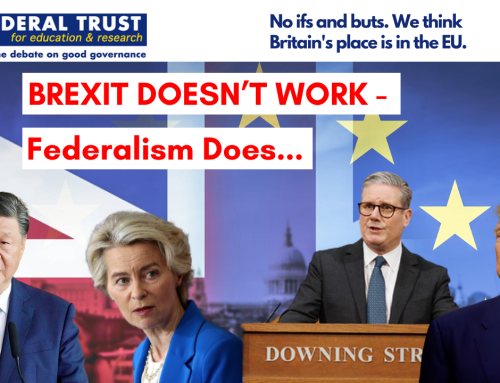by John Palmer
December 2016
Article first published by Itish Institute for European Affairs (IIEA), Dublin
Given the momentous significance of the British decision to exit the European Union, it is striking how little firm information about what it might mean is, as yet, in the public domain. We know that the Prime Minister, Theresa May, intends to submit an Article 50 application for negotiations with the EU on Brexit before the end March, 2017. This in turn will trigger a clock which marks a two year maximum period to complete any negotiations and facilitate the break between the UK and the EU.
However, the EU’s chief Brexit negotiator, Michel Barnier, has made clear that in practice the negotiators will only have 18 months in which to finalise an agreement. This is because six months has to be set aside for securing the agreement not only of the British Parliament but the governments and Parliaments of the other 27 Member States and the European Parliament.
Until Mrs May agreed a last minute concession to the Labour opposition in Westminster, it was not even certain that Parliament would not try to block the triggering of Article 50, because of the deep anxieties of not only the Labour Party but also many Remain minded Tory MPs, Liberal Democrats, Scots and Welsh nationalists and the SDLP in Northern Ireland. To avoid this Mrs May has now promised more information on what kind of deal she is seeking.
Meanwhile the UK Supreme Court could inject a further serious complication for the government in January should it rule in a court case that a positive approval of Parliament for triggering Article 50 is a constitutional necessity. As a result the government may have to divulge much more detail about its precise Brexit negotiating objectives than the cabinet wants.
We do not even yet know whether or not the agreement the government seeks in Brussels will be a final exit from the EU or merely a “transitional” accord which might leave some critical aspects of UK involvement in the EU to be resolved over subsequent years. This may be necessary if the UK seeks a complex deal effectively allowing some participation in the Single Market for at least some priority industrial and financial sectors. But the government cannot at present even confirm whether or not the UK will remain in the Customs Union.
The free movement issue is particularly highly politically contentious for two reasons. Firstly EU leaders – including Chancellor Merkel – have ruled out any “pick and mix” deal for the British which might violate the “four freedoms” for the free movement of capital, services, trade and people. But British restrictions on the movement of EU workers to the UK outrages many eastern and southern European governments.
On the British side, many hard line Tory Euro-sceptics would be appalled if London agrees to continue paying to the EU budget, accepts being partially subject to European Court of Justice ruling in matters which might affect British interests in the Single Market, or above all, dilutes national border controls. UKIP is meanwhile poised to strike if the Tory party vacillates.
That said the UK Brexit minister, David Davis, has conceded that the UK might have to “consider” continuing contributions to the budget in the forthcoming negotiations. But across the cabinet, whatever their other barely disguised differences on tactics ministers, so far refuse any concessions on reinstating national control of the UK’s borders.
There is one glaring lacuna in the UK government’s hard line on restoration of border controls – the border which runs across the north of Ireland. Ministers have already in effect ruled out any restoration of the old border controls which were superseded by the travel free zone in the Belfast peace agreement.
So how does London propose to control possible movement of EU citizens first to the Republic, then across the border and onto mainland Britain? There is talk of “high tech” solutions (possibly some kind of ID system for EU citizens who come the UK after Brexit itself). Or might it mean – at least in the interim – some kind border controls within the UK itself for travellers coming from Northern Ireland (along the lines of temporary passport controls between the north and mainland Britain during the Second World War.)
This issue – among many others – may loom even larger if the Supreme Court rules that any submission of Article 50 requires not only the approval of the Westminster Parliament but the assent of the devolved administrations in Scotland, Wales and Northern Ireland. In such circumstances, the Scottish government might seek London’s approval to negotiate a special, more intimate relationship of its own with the EU, in return for not blocking activation of Article 50.
Plenty of other potential political landmines lie in Mrs May’s path. Her government is coming under increased pressure to leave as much as possible of the UK’s higher educational and scientific integration with the EU as possible. Meanwhile questions are growing about the potential cost of promised government compensation to key industries for any loss of competitive advantage from leaving the EU, something hinted at in a recent agreement between the government and Hitachi apparently addressing compensation claim for current uncertainties over Britain’s future access to the single market.
The biggest question lurking behind everything else is what happens if Parliament rejects the agreement which merges from the Article 50 process. Rejection of an agreement would not in itself amount to overthrowing the outcome of the Brexit referendum last June. Ms Thatcher’s precarious majority might be threatened by a coalition of opposition pro-Remain parties and hard line Euro-sceptic Tory MPs who object to concession the UK may been forced to offer.
Would the government then have to withdraw Article 50 (as it has the right to do within the two year grace period) to hold a new referendum, or a general election or simply to abandon the agreement and seek some internal adjustments to existing EU policies while remaining a member. Failing that such a deadlock when the deadline passes could force the government to open (probably protracted) negotiations to re-join the World Trade Organisation. This could involve many more years of uncertainty while the UK tries to negotiate comprehensive free trade agreements with WTO countries; an outcome which many experts fear would be disastrous for the British economy.
John Palmer was a Founder and Political Director of the European Policy Centre. He is a member of the Strategic Council of the EPC in Brussels and the Federal Trust Governing Council in London





